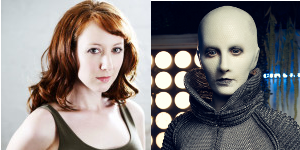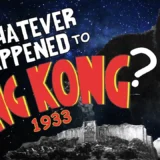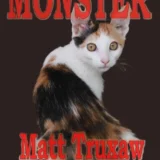 Veronica Scott for AMAZING STORIES: Welcome to my periodic series of author profiles. Today I’ve chosen Tracey Cooper-Posey, author of over 100 novels and the creator of one of my all time favorite ‘generation ship” scifi romance series, The Endurance.
Veronica Scott for AMAZING STORIES: Welcome to my periodic series of author profiles. Today I’ve chosen Tracey Cooper-Posey, author of over 100 novels and the creator of one of my all time favorite ‘generation ship” scifi romance series, The Endurance.
VS for ASM.: What was the first scifi romance book you ever read and what did you like about it?
TCP: That’s going back a ways!
If I’m being painfully correct, then the very first SFR I ever read was The Empire Strikes Back. The romance in that started in Star Wars, and concluded in Return of the Jedi, but it was the first kiss, the romantic conflict, the sassy dialogue, and the heart-rending “I love you” scene in The Empire Strikes Back that gripped my heart and squeezed. Star Wars is the reason I’m a writer, and the romance in the trilogy blew my mind. I loved it.
But a movie tie-in doesn’t have anything close to the substance that a “real” novel has.
So let me qualify my answer.
In the early 1990s, which was at least a decade after Star Wars had broken box office records everywhere, the traditional romance publishers—who were the only publishers, then—finally unclenched enough to timidly “try” science fiction romance. I say “timid” because they really didn’t try very hard at all. They refused to call it science fiction romance. It was “futuristic” romance.
I was over the moon about the new category. Only, living in Australia made it almost impossible to acquire the titles. Back then, the bookstores stocked mostly British and Australian fiction and none of it was romance. If you wanted romances, you had to mail order them. And there were no publishers in the US shipping out mail orders. Which is why most Australian romance lovers read Harlequin Mills & Boon, which shipped from Britain.
I did manage to get hold of a secondhand copy of my very first SFR. I have no idea how the original purchaser acquired it. I confess I’m a bit annoyed about this, but I can’t remember the title or author! It was an American-published book, by one of the NY publishers. It was a SFR that featured a hot pilot (the heroine, in a nice gender switch of roles), and a hero who was a slave, who she escaped off planet with and freed.
I loved it because it was science fiction, although the romance heavily outweighed the SF part of the story…but the SF was there, at least.
Alas, it would be years before I read another SFR, simply because they were so hard to find. It took indie publishing to change that.
Ultimately, the futuristic romances I could get from traditional publishers failed to satisfy. They were just too much romance and too little science fiction. Like many historical romances, the non-romance elements were wallpaper – a pretty backdrop for a fairly conventional romance to play out in front of.
Many years later (long after I moved to Canada), I came across an anthology, Tales from the SFR Brigade, which I loved. It was the first time I became aware that Romanceland was finally categorizing the books as they should, as science fiction romance, instead of the cutesy prevarications the trad publishing world had been using. In addition, SFR was intended to be 50/50 romance and SF – and I turned cartwheels over this!
It was also the first time I learned there was a group of SFR authors and an organization that supported them. I joined the organization and promptly began writing my first SFR.
ASM.: What was the first scifi romance book you wrote, when, give us the 2-3 sentence logline.
 TCP: The very first SFR I wrote was Faring Soul, book 1 of The Interspace Origins series:
TCP: The very first SFR I wrote was Faring Soul, book 1 of The Interspace Origins series:
Rumors emerge that Catherine Shahrazad has returned from the fringes and been seen in Federation space. Wherever she goes, her name and her history cause civil unrest, riots and worse. The Federation Board doesn’t want her there. Neither do the leaders of Cadfael College, the educators and moralists of the galaxy. No one pays any attention to the reticent navigator called Bedivere X, who pilots her ship better than she does.
The truth about Bedivere threatens the entire Federation. His feelings for Cat might just save everyone.
It was first published in September 2015 and it was one of the hardest books I’ve ever written. I was completely intimidated by science fiction, and felt like an underqualified imposter. I didn’t have a science degree and no technical training. Who was I to write about planets, stars and space ships?
I only managed to write the book by world building until I was dizzy (and my series bible has more words in it than the series itself), and by coaxing myself to just write the next sentence, then the next paragraph. I wouldn’t allow myself to worry about what anyone would think of the story, or the book would never have been written.
It was very gratifying, then, to have the book win a SFR Galaxy Award in the year it was released. 😊
ASM.: None of us can ever pick a favorite book or character but if you had to go live in one of your own books, which would you choose and why?
TCP: I would want to live in the story world of the Interspace Origins series for a number of reasons. The first reason is that in the Interspace universe, there is near immortality via regeneration techniques, which gives everyone incredibly long lives in which to achieve anything they want.
Longevity provides possibilities us short-lived contemporary humans just can’t grapple with. For example, let’s say you will live for three hundred years at least. (And scientists are saying that the first human to live to 150 has already been born, so living to 300 isn’t that far away). Anyway, you have 300 years, you’ve just finished your basic education and you’re trying to figure out what you’re going to do for your first career.
That’s the joy of a long life. You don’t have any of the pressure to chose one career or profession or occupation and that’s it. You can spent ten years educating yourself in a profession, rising through the ranks, and becoming a well qualified expert. Then, after thirty or so years of that, you could spend another ten years learning a completely different trade or occupation, and spending a few decades doing that.
You could fall in love with someone and still be with them two hundred years later. Only, what does a relationship that lasts for centuries look like? How is it different from our modern relationships? How do children come into it? You could spend a few decades alone with your love, before having children. And even then, the children become adults in a mere twenty years… It’s a completely different perspective and approach to love.
And the second reason is that I love the characters in the series, and the Varkans in particular. I can’t explain the Varkans without laying down massive spoilers. But they’re fascinating to me. Spending time with them, and with Cat and Bedivere and their friends would be enormous fun.
ASM.: How do you go about world building? Do you do elaborate planning, keep a big file, use post its, wing it – what method works for you?
TCP: I’ve learned to control how much world building I do before starting to write a book or series (I tend to write in series). From experience, I’ve learned that a lot of the angst-filled decisions I’ve made about a series before writing it never make it into the books, not even by implication.
Yet there is a huge amount of world-building that happens as I plot, and also as I’m writing, that I must carefully add to the series bible as I go along.
So yes, I do elaborate planning beforehand, but do just as much as I go. I keep everything in a OneNote notebook, with sub-sections and pages, charts, tables, images and more.
ASM.: I think that’s one reason I enjoy The Endurance Series so much – the worldbuilding is so solid. Your own favorite tropes? Least favorite tropes?
TCP: I like the high tech stuff, especially AI and computer sentience. Plus, long life for humans tends to creep into a lot of my books. That’s on the SF side. I also tend to favor strong women characters who hew their own lives.
I don’t really have favourite tropes for the romance side, but there are some tropes I tend to steer clear of.
Marriages of convenience don’t have an easy or convenient place in SF settings, for example. The world building would have to include a dystopian style restrictive society that made a marriage of convenience logical and feasible….but you’d have to spend a lot of pages justifying the marriage and making it work in the society it’s set in.
Enemies to lovers would work well in a sprawling space opera…in fact, I may have to write one of those!
But most of the time, I don’t lean toward one trope or another, because SFR allows you to explore romance and relationships in a way that just isn’t possible in contemporary genres. I’ve already mentioned about romances lasting a few centuries in an earlier question.
But there’s all sorts of factors that can change the way love happens in the future. Women’s role in society could be completely different, and falling in love when you’re the head of a global government brings about romantic challenges you just don’t see in contemporary romances.
How people move among the stars, how long it takes, would impact a romance. So would the politics of the day. Galactic empires or computer-controlled utopias would change the way a romance could play out.
It’s possible in SFR to write a romance that doesn’t fit any of the tropes, which is one of the beauties of the genre.
ASM.: Do you also write other genres? Which ones? How does writing a book in that genre compare to writing an SFR?
 TCP: I write in all the major romance sub-genres, including thrillers, paranormal and historical romances. I also have an historical suspense series that is not technically a romance, but has romantic elements. I do stroll all over the place!
TCP: I write in all the major romance sub-genres, including thrillers, paranormal and historical romances. I also have an historical suspense series that is not technically a romance, but has romantic elements. I do stroll all over the place!
And while I’m confessing, I should also add that I write “straight” science fiction and “straight” fantasy under two other pen names.
I don’t think there is a genre that is easy to write. They all have their own challenges. I once had a conversation with a reader who thought that science fiction romance would be a doddle to write in comparison to, say, historical romance, where the author is restricted to the facts of that society and era.
And while it is true that for SFR, the sky’s the limit, that actually brings difficulties of its own. Where do you start? Where do you go? If you can take a story anywhere you want, you can become paralyzed by the infinite choices.
Plus, every choice you do make eliminates a bunch of possibilities.
For example, deciding that your story world doesn’t have FTL travel immediately sets up a far different story than a world that does enjoy FTL travel. If it takes 100 years to get to the next star system, or two years to get to Mars, then you can’t have a heroine with her own ship, trading goods between planets. The story has to take place on a single planet, or at most, a planet and a nearby moon.
While a world that has faster than light travel can feature ships flitting between stars and planets, and a hero who comes from far away.
Is star travel cheap or super expensive? Does everyone frequently travel between stars? Whatever the answer is to those basic questions, it fundamentally changes your story.
So, no, I would not say that SFR is easy to write. Certainly, it is not easier to write than any of the other genres I write in.
ASM.: Do you have a ‘writing buddy’ pet? Care to share a photo?
 TCP: I did have a writing buddy. Pippin liked to sit beside me, or sit beside my keyboard and pat the back of my hand so I would get all the words right. We lost Pippin a year ago this month. This photo is the last one we have of him, taken only a couple of weeks before he left us.
TCP: I did have a writing buddy. Pippin liked to sit beside me, or sit beside my keyboard and pat the back of my hand so I would get all the words right. We lost Pippin a year ago this month. This photo is the last one we have of him, taken only a couple of weeks before he left us.
I will one day find another writing buddy. They’re good for handing out scratchies while I think of the next bit to write—stops me from reaching for snacks, instead.
ASM.: What’s next for you?
TCP: I plan to complete the rest of my Endurance series, which features romances among the residents of a generation ship, The Endurance, which will take a 1,000 years to reach its destination. Last year I released book 9, Mongrels United, and book 10 is on my schedule—there will be at least 12 books before the series story is fully told, I suspect. This series is a favourite among my readers.
After that, I’m considering two options; A spin off series from Interspace Origins (which will have to be called, by default, “Interspace” – with perhaps a qualifier added to it), or a brand new series in a new world that may or may not be space opera (which I love).
I will, of course, end up doing both. But it’s the question of which one I do first that is vexing me right now. 😊
My releases slowed down considerably over the last year while I dealt with cancer and related chemo treatments, but I’m picking up speed bit by bit, and would like to get back to my former release pace of a novel a month, for that is what allows me to write in so many genres.
ASM.: Congratulations on finishing all the treatments and now getting back up to speed gradually. That’s such great news! What’s on your To Be Read List?
TCP: My TBR pile is large and magnificent. I’m glad it’s electronic! There are a great many books on it. I tend to read in batches, by author. So I’ll binge on Anne McCaffrey’s Pern series, for example (a favourite for re-reading—I love the later books that deal with the origins of Pern and how the dragons deal with the Red Star). Or Anne Aguirre, when I want punkish attitude. Currently nearing the top of my pile is Linnea Sinclair, Cynthia Sax, Andre Norton, Elizabeth Bear, John Wyndham.
I read a lot of SF that isn’t considered to be SFR, but features fabulous romances, all the same. Dune, for instance, is a fantastic romance—the fact that the very end of the book, the very last scene, is a statement about love and marriage and Chani’s future with Paul is significant. And most of Paul’s actions in later books are driven by his love for Chani. Yes, the sandworms and the spice provide wonderful storylines of their own, but the romance is just as important.
Most readers tend to look at me sideways when I say that Robert A. Heinlein has some great romances in his SF, but he does. The romance in Time Enough for Love drives the theme of the book. The ending can make me cry, every single time I read it. And the title alone says everything.
In fact, it was the romances I found in science fiction that got me writing romance in the first place. The old (rusty) advice given to new writers is to write what you know, or to write what you read. The only problem for me, facing that advice, is that I read everything. I am an omnivore, equally happy to read a Mills & Boon Romance, or the latest John Scalzi SF, and everything in between.
When I tried to find the common elements among all the books I loved to read, I spotted a pattern. All my very favourite books feature a highly emotional romance. Given that, it seemed sensible to me to write romances.
And I have been reading and writing stories with powerful romances in them ever since.
ASM.: Give us your short author bio and where you can be found on social media.
Tracy Cooper-Posey writes romantic suspense, historical, paranormal and science fiction romance. She has published over 120 novels since 1999, been nominated for five CAPAs including Favourite Author, and won the Emma Darcy Award.
She turned to indie publishing in 2011. Her indie titles have been nominated four times for Book Of The Year. Tracy won the award in 2012, and a SFR Galaxy Award in 2016 for “Most Intriguing Philosophical/Social Science Questions in Galaxybuilding” She has been a national magazine editor and for a decade she taught romance writing at MacEwan University.
She is addicted to Irish Breakfast tea and chocolate, sometimes taken together. In her spare time she enjoys history, Sherlock Holmes, science fiction and ignoring her treadmill. An Australian Canadian, she lives in Edmonton, Canada with her husband, a former professional wrestler, where she moved in 1996 after meeting him on-line.
Find Tracy at https://TracyCooperPosey.com
USA Today Best Selling Author
Veronica Scott grew up in a house with a library as its heart. Dad loved science fiction, Mom loved ancient history and Veronica thought there needed to be more romance in everything. When she ran out of books to read, she started writing her own stories.
Seven time winner of the SFR Galaxy Award, as well as a National Excellence in Romance Fiction Award, Veronica is also the proud recipient of a NASA Exceptional Service Medal relating to her former day job, not her romances!
She read the part of Star Trek Crew Member in the official audiobook production of Harlan Ellison’s “The City On the Edge of Forever.”









